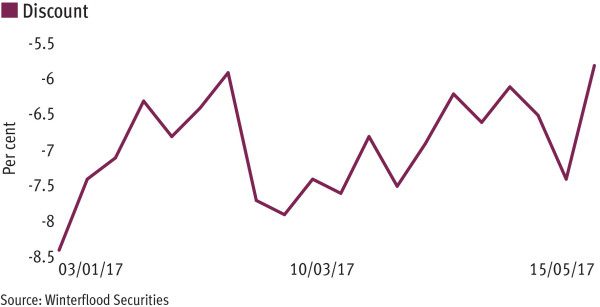

Ongoing transparency issues with peer-to-peer (P2P) lending trusts could mean more trouble ahead, according to analysts, after a period in which the sector was hit by writedowns and reviews.
Recent months have seen problems return to the fore in the £2bn trust sub-sector, which has attracted investor interest in part because of yields well in excess of 5 per cent.
P2P Global Investments’ review of management arrangements was followed by news of a writedown at Ranger Direct Lending, and although the average discount for the sector has improved since the scandal at US provider Lending Club rocked the sector last year, it remains at 5.8 per cent. Some analysts said a lack of disclosure made it difficult for faith to be restored.
Panmure Gordon’s Charles Murphy said it had become clear disclosure levels from P2P trusts were “pretty weak”, particularly with regard to underlying investments.
“You have to rely on the manager’s broad description to take a view of what [the trust] really is. Most of the time you are not getting the detail [as an investor] and even where they give detail, they are not telling you the credit quality of the portfolio,” he added.
Winterflood also criticised certain P2P investment trusts over disclosure levels in its latest monthly report. Analyst Simon Elliott said Ranger Direct’s partial writedown of a 20 per cent exposure to the struggling Princeton Alternative Income fund was a “disheartening episode”. Princeton had previously said its NAV would not be affected by problems at firms in which it had invested.
Mr Elliott added: “It should be obvious that a fund targeting unlevered gross returns of 12-13 per cent and a 10 per cent dividend yield comes with an element of risk…However, the lack of transparency with regards to the investment in Princeton is concerning.”
Of the six funds in Winterflood’s P2P trust sector, three are trading on double-digit discounts, although one – Honeycomb – trades on a premium of 12.2 per cent.
The largest fund in the space, P2P Global, informed investors of its management review earlier this year after a torrid 2016. Numis and Killik both noted that the announcement contained “little detail” about its scope, nature or timespan.
Cantor Fitzgerald director of investment company research Monica Tepes played down any sector-wide concerns, suggesting issues were company specific, but did agree transparency had been an issue.
“Being uncertain can rattle investors more than having information that might not paint the brightest picture,” she said. “Communication can always be better and it is evolving – it is a feedback process.”
She added: “These are teething issues. It is surprising this is something nobody thought about at the drawing board, and it’s not great for investors, but I would not go as far as saying it’s a sector-wide problem.”
However, Mr Murphy said the growing number of negative news stories regarding P2P meant reforms were necessary.
He said: “The cycle you normally see is the disclosure in a new sector starts pretty light. Then you have a problem, then investors ask questions, then you get more disclosure. We’re in the third phase. Disclosure has not flowed through yet.”



